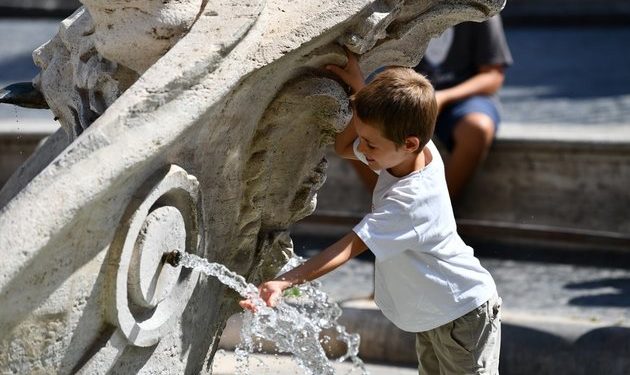Dozens of Italian municipalities have reported temperatures above 40 degrees Celsius this week, with several topping 45 degrees Celsius. On Wednesday, the hottest temperature ever recorded in Europe — 48.8 degrees Celsius, was registered in the city of Syracuse on the southern Italian island of Sicily.
ROME, Aug. 15 (Xinhua) — Laurel Toussaint was already exhausted by late morning on Friday, the hottest day of the year so far in much of Italy.
Sitting in the shade on the edge of a fountain in Piazza Venezia, Rome’s main square, Toussaint, a music teacher visiting Rome with a group of friends from Belgium, said the heat had sapped the group’s strength.
“I’ve been coming to Italy every two or three years since I was a kid,” Toussaint, 39, told Xinhua. “But I’ve never felt this hot. It’s too hot to be out; it just drains your strength. Within half an hour of leaving our hotel, we were already all dripping with sweat.”
The latest heatwave has sparked heat and humidity warnings across much of southern Europe, but Italy may be the hardest-hit part of the continent.
Dozens of Italian municipalities have reported temperatures above 40 degrees Celsius this week, with several topping 45 degrees Celsius. On Wednesday, the hottest temperature ever recorded in Europe — 48.8 degrees Celsius, was registered in the city of Syracuse on the southern Italian island of Sicily.

“What we’re seeing is a combination of factors, including hot weather from the Sahara Desert in North Africa moving across the Mediterranean, multiplying the impacts of an already hot summer,” meteorologist Antonio Sano, founder and director of Il Meteo, one of Italy’s main weather sites, told Xinhua.
Sano said that while Italy has always been prone to hot spells, the impacts of climate change and urbanization are making the periods of high heat more extreme and more long-lasting, especially when combined with anomalies like the arrival of masses of hot air from the desert.
“We used to see heatwaves that would last four or five days,” Sano said. “But we’ve been suffering from these unusually hot temperatures in Italy since the start of June more than two months ago.”
That hasn’t been lost on Italian residents. Alberto Bonocchi, 49, a tour bus driver in the Italian capital, said he’s noticed the impact of the heat when he works.
“We’ve slowly seen the tourists return after the impacts of the coronavirus pandemic,” Bonocchi told Xinhua. “But you would never know it driving around the city between around noon and 4 p.m.: The streets are deserted. Everyone is waiting out the heat in the air conditioning somewhere or the shade.”

Antonella Nuzzolo, 80, a retired shopkeeper, said the definition of a heatwave has changed in her lifetime.
“When I was a girl, a temperature of 33 or 35 degrees (Celsius) was worth talking about,” Nuzzolo told Xinhua. “Everyone would say, ‘Oh, it’s so hot today,’ and we’d splash water on our necks to keep cool. Now, if it’s 33 degrees in the summer, it seems cool compared to what we’ve seen in the last few years.”
Financier Erick O’Neal, 29, a native of London living in Zurich, made a similar point.
“I’ve been telling my colleagues in Zurich that if they want to know what heat was they should come to Italy,” O’Neal told Xinhua while waiting in line to refill his water bottle near Rome’s Colosseum. “What we think is midday heat is cool nighttime weather in Rome.”
But there should be some good news on the horizon, at least in the short term.
Roberto Morgantini, a meteorologist specializing in extreme weather phenomena, said Italy’s current hot stretch will lose some of its potency by next week.
“This is an anomaly but it will cool a little by next week,” Morgantini told Xinhua. “We should see some cooler Atlantic air moving in to give us some relief, at least for a while.”
Still, according to Morgantini, the trend lines broadly indicate warmer summers going forward.
“Next summer might be cooler than this one depending on the conditions,” he said. “But overall, the baseline of what is considered normal heat is going to climb over time. The heat of this summer won’t stand out over the long term.”







